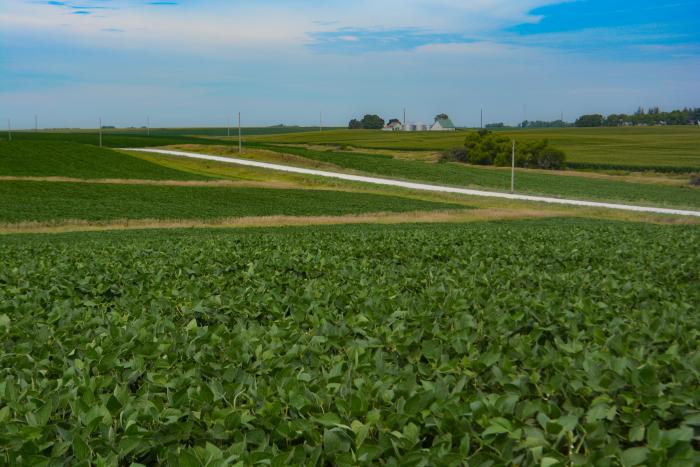General Mills, Unilever Invest in UMD-Led Sustainable Agriculture Initiative
Gifts Will Help Strengthen Research on Sustainable and Regenerative Agriculture Practices—By Way of Satellites
Two consumer goods giants, General Mills and Unilever, recently made significant investments in a University of Maryland-led initiative to evaluate the adoption and efficacy of climate-smart farming practices.
The Harvest Sustainable and Regenerative Agriculture Initiative, or Harvest SARA for short, uses satellite measurements to shed light on the suitability of certain land management techniques for meeting the twin challenges of agriculture: Farmers and ranchers producing robust yields that are gentle on the ground from which they came.
“We are seeing more studies that use satellite data that measure the state of adoption of different practices like cover cropping, reduced tillage, and grassed waterways over very large areas, and we also are seeing studies that use satellite data to map agricultural outcomes like crop yield over very large areas,” explained Alyssa Whitcraft, Harvest SARA’s founding executive director and a research professor in UMD’s Department of Geographical Sciences. “But there have been comparatively fewer studies that link practices with outcomes, which we saw as a missed opportunity to support sustainable and regenerative transitions.”
General Mills and Unilever are hoping to help Harvest SARA close that knowledge gap.
"We know from working with farmers, suppliers, and partners that sustainable and regenerative agriculture practices can make a positive impact at scale,” said Andrew Wilcox, Associate Director of Business Operations Sustainability with Unilever. “As a neutral and trusted science-based initiative, Harvest SARA can help to improve the accuracy, availability, and accessibility of key data on farming practices and impacts, bringing together the agri-tech community to create rigor and reproducibility in this rapidly developing field."
Initially established through funding from NASA, Harvest SARA is one of three NASA Harvest initiatives, all of which use satellite observations of Earth to increase food security, improve agriculture, strengthen the environment, and combat climate change in their areas of focus. Unilever and General Mills’ gifts to the Harvest SARA Initiative Fund will be used to build a robust and actionable evidence base for various management practices, and provide science-based, good practices for quantifying environmental, economic, and social outcomes associated with their adoption.These insights will be inherently more accessible to a broad, global audience of scientists, companies, farmers, and ranchers thanks to Harvest SARA’s setup within the University of Maryland College Park Foundation, through which the initiative operates as a 501(c)3 that anyone can contribute to, and benefit from.
“Our work on regenerative agriculture is focused on catalyzing change at scale, though tracking changes in agricultural practices and outcomes at the landscape level poses a challenge,” said Steve Rosenzweig, Ph.D., Principal Agriculture Scientist at General Mills. “Satellite imagery and modeling can help us monitor the adoption and impact of regenerative agriculture, and we believe the collaboration through Harvest SARA can help advance this critical scientific field.”
Under Whitcraft’s direction, the initiative has already established a working group of public and private sector modelers, soil scientists, statisticians, and agronomists to work together precompetitively to evaluate how various crop, soil, and greenhouse gas outcomes are currently being measured and modeled. The working group is also working collaboratively to identify where and how to improve everyone’s—from farmers to policymakers to consumers—collective ability to account for agriculture’s interaction with the environment.
Microsoft is supporting the initiative by developing systems that protect sensitive farm data and scientific intellectual property without sacrificing the collaborative innovation that’s needed to solve some of the field’s most pressing issues.
“A lot of people don't realize that farmers are juggling pressures to continuously increase production and to protect their largest capital asset—the land they own or work—while also dealing with global change and extreme weather. It is counterproductive—and inaccurate—to talk about agriculture as a blanket environmental problem, when in reality it not only literally sustains humanity, but also offers great opportunities for environmental benefit,” says Whitcraft. “I think satellites can help farmers realize these benefits, both by helping build evidence about ‘what works where’ and telling success stories that can reframe that narrative. We just have to collectively improve the methods to map agriculture, and that’s what Harvest SARA, through these donations, aims to do.”
Inquiries about opportunities to partner with the Harvest SARA initiative can be directed to info@harvestsara.org.
The photo of a soybean field in Southeast Iowa is provided by Nicole Pepper (NASA Acres).
Published on Wed, Feb 14, 2024 - 9:43AM




